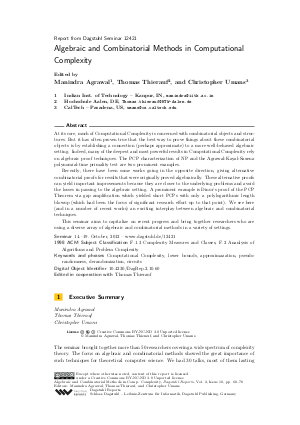Algebraic and Combinatorial Methods in Computational Complexity (Dagstuhl Seminar 12421)
Authors Manindra Agrawal, Thomas Thierauf, Christopher Umans and all authors of the abstracts in this report
-
Part of:
Issue:
Dagstuhl Reports, Volume 2, Issue 10
Part of: Volume: Dagstuhl Reports, Volume 2
Part of: Journal: Dagstuhl Reports (DagRep) - License:
 Creative Commons Attribution-NonCommercial-NoDerivs 3.0 Unported license
Creative Commons Attribution-NonCommercial-NoDerivs 3.0 Unported license
- Publication Date: 2013-02-18
File

PDF
DagRep.2.10.60.pdf
- Filesize: 1.26 MB
- 19 pages
Document Identifiers
Subject Classification
Keywords
- Computational Complexity
- lower bounds
- approximazation
- pseudo-randomness
- derandomization
- circuits
Metrics
- Access Statistics
-
Total Accesses (updated on a weekly basis)
0PDF Downloads0Metadata Views
Abstract
At its core, much of Computational Complexity is concerned with combinatorial objects and structures. But it has often proven true that the best way to prove things about these combinatorial objects is by establishing a connection (perhaps approximate) to a more well-behaved algebraic setting. Indeed, many of the deepest and most powerful results in Computational Complexity rely on algebraic proof techniques. The PCP characterization of NP and the Agrawal-Kayal-Saxena polynomial-time primality test are two prominent examples. Recently, there have been some works going in the opposite direction, giving alternative combinatorial proofs for results that were originally proved algebraically. These alternative proofs can yield important improvements because they are closer to the underlying problems and avoid the losses in passing to the algebraic setting. A prominent example is Dinur's proof of the PCP Theorem via gap amplification which yielded short PCPs with only a polylogarithmic length blowup (which had been the focus of significant research effort up to that point). We see here (and in a number of recent works) an exciting interplay between algebraic and combinatorial techniques. This seminar aims to capitalize on recent progress and bring together researchers who are using a diverse array of algebraic and combinatorial methods in a variety of settings.
Cite As Get BibTex
Manindra Agrawal, Thomas Thierauf, and Christopher Umans. Algebraic and Combinatorial Methods in Computational Complexity (Dagstuhl Seminar 12421). In Dagstuhl Reports, Volume 2, Issue 10, pp. 60-78, Schloss Dagstuhl – Leibniz-Zentrum für Informatik (2013)
https://doi.org/10.4230/DagRep.2.10.60
BibTex
@Article{agrawal_et_al:DagRep.2.10.60,
author = {Agrawal, Manindra and Thierauf, Thomas and Umans, Christopher},
title = {{Algebraic and Combinatorial Methods in Computational Complexity (Dagstuhl Seminar 12421)}},
pages = {60--78},
journal = {Dagstuhl Reports},
ISSN = {2192-5283},
year = {2013},
volume = {2},
number = {10},
editor = {Agrawal, Manindra and Thierauf, Thomas and Umans, Christopher},
publisher = {Schloss Dagstuhl -- Leibniz-Zentrum f{\"u}r Informatik},
address = {Dagstuhl, Germany},
URL = {https://drops.dagstuhl.de/entities/document/10.4230/DagRep.2.10.60},
URN = {urn:nbn:de:0030-drops-39034},
doi = {10.4230/DagRep.2.10.60},
annote = {Keywords: Computational Complexity, lower bounds, approximazation, pseudo-randomness, derandomization, circuits}
}
